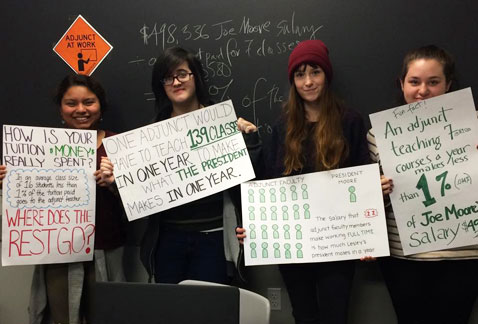Lesley ‘core faculty’ talk of unionization while adjunct labor talks drag after year
![]()

Lesley University students show signs in support of improvements in faculty pay and benefits. (Photo: Lesley Adjunct Faculty Unite)
After voting to form a union for adjunct professors almost exactly a year ago, Lesley University educators are back with a next step: getting “core faculty” organized and fighting alongside the adjuncts for better pay, benefits and security.
Despite the 357-67 vote Feb. 24 to join the Adjunct Union arm of the Service Employees International Union, negotiations with the university haven’t achieved a contract.
“Progress in negotiations has been too slow,” said Sarah Slavick, an adjunct professor in the fine arts department of Lesley’s College of Art and Design who spoke Monday before the City Council asking for a resolution putting pressure on the university. The order, introduced late by councillor Nadeem Mazan, returns for a vote next week.
In the meantime, the university’s more than 700 adjunct faculty would “make better money working for Starbucks” than teaching four courses a year at Lesley, said Jason Pramas, who has taught communications at Lesley since 2012. “When they can get four.”
Core faculty
Pramas, promoted eight months ago to core faculty on an emergency basis, finds life not much better in his new position.
The title, he said, “sounds nice and might make you think that ‘core faculty’ such as myself are tenured or tenure-track, which would be the case at almost any other comparable university in the country. But we’re not. There is no tenure at Lesley University.”
“In fact, core faculty at Lesley are all either half-time or full-time contract faculty – that is to say, contingent faculty just like adjuncts,” he said, explaining that he would likely return to adjunct status next year and slip back from a $32,000 salary plus benefits and an office to no more than $3,500 a course with no benefits and an office shared by hundreds of fellow adjuncts.
“Unfortunately, getting promoted to core faculty at Lesley is not a one-way ticket to secure employment,” he said. “Not because anyone in Lesley administration lied to me or promised anything they didn’t deliver on – my situation is simply part of a structural problem at Lesley and throughout the higher education industry today … Unless the adjunct union succeeds in pushing the Lesley administration to sign a fair contract and increase that pay to something more in line with a market rate per course plus some pro-rated benefits and job security.”
“We are the working poor”
Slavick, who has taught at Lesley for 15 years, had an even more dire message about adjuncts, whose schedules and pay can be altered with little or no warning by the school, with courses created or cut days before classes begin and pay halved suddenly if too few students sign up: “Some of us are living below the poverty line,” she said. “Poverty is poverty, and we are the working poor. Maybe of us need food stamps”:
Just as the country’s gains have almost all gone to the 1 percent, there has been explosive growth in the administrative positions and the salaries of those positions at Lesley over the past decade, while adjunct pay at Lesley remains miserably low, at poverty levels. Over a dozen administrators at Lesley make over six figures. An adjunct faculty would have to teach 28 courses a year to reach that figure.
“We teach the same classes for the same credits as our full-time colleagues but receive a fraction of the pay. My credentials match and in many cases surpass those of my full-time colleagues. And yet I do not get retirement or health benefits and little faculty development support,” Slavick said.
University response
John Sullivan, director of communications for Lesley University, said administrators were aware of educator efforts on core faculty as well as concerns about slow adjunct negotiations – Pramas and Slavick submitted letters on both topics to the council – but the administration’s official statement focused on negotiations.
“The university believes significant progress has been made and is optimistic that we will reach resolution on the remaining items,” Sullivan said. “The university will continue to engage in negotiations with the adjunct faculty at the bargaining table, not in public.”
“Lesley University values all its faculty members and their commitment to our educational mission,” he said.
Last year, university president Joseph B. Moore and provost Selase W. Williams urged adjuncts to vote against unionization and to “give us the chance” to address concerns outside formal labor negotiations. “We are more aware of adjunct faculty concerns following recent media reports and the numerous meetings we have had with adjunct faculty in the past two months,” they wrote Feb. 4, 2014.

